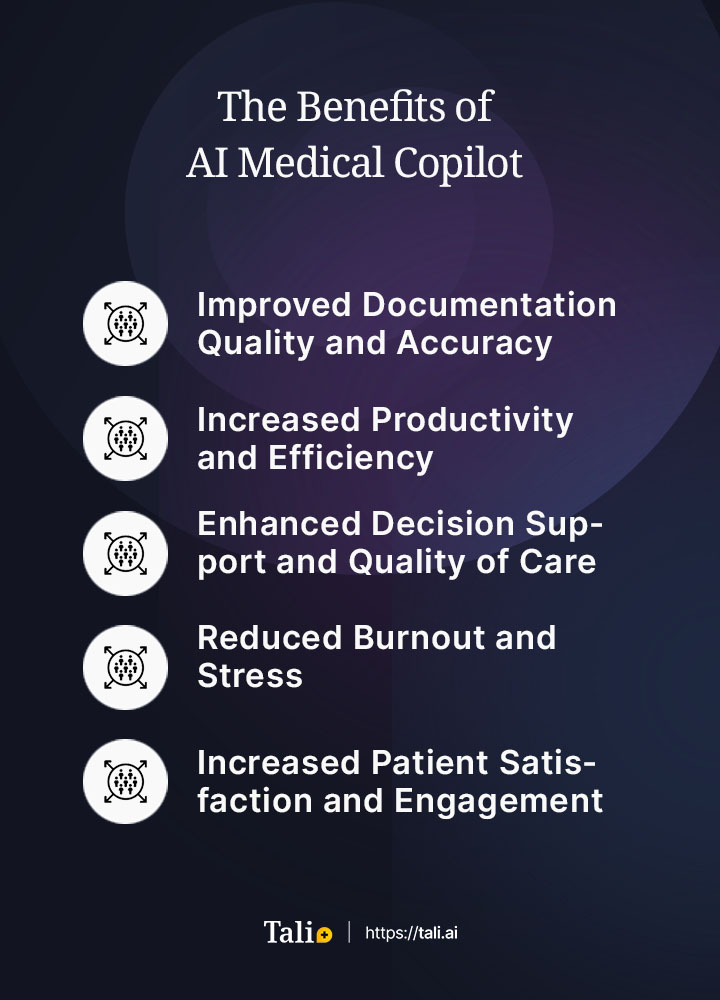Documentation and Administrative Tasks?
Physicians understand the importance of documenting patient encounters accurately and efficiently. They also know the challenges of keeping up with the increasing demands of clinical documentation, such as coding, quality measures, and regulatory compliance. Not to mention the time and cognitive load that documentation takes away from the core mission of providing quality care to patients.
What if there was a way to make clinical documentation easier, faster, and more accurate? What if physicians had an AI copilot that could assist them with capturing the relevant information from patient interactions, generating comprehensive and compliant notes, and providing real-time insights and recommendations based on the latest evidence and best practices?
In this blog post, we will explore the concept of AI medical copilot in more detail. We will explain how it works, what are its advantages and disadvantages, and what are some of the examples of AI medical copilot solutions in the market. By the end of this post, physicians will have a better understanding of AI medical copilot and how it can help them improve their practice and patient care.

AI medical copilot refers to a system that can generate natural language summaries, recommendations, and reminders based on the patient’s data, the physician’s input, and the relevant medical knowledge.
AI medical copilot is not a replacement for human judgment or expertise. Rather, it is a tool that can augment physicians' capabilities and enhance their efficiency. It can help them capture the patient’s story, document the encounter, order tests and treatments, follow up on results and outcomes, and provide evidence-based guidance.
AI medical copilot uses advanced natural language processing (NLP) techniques to understand and produce natural language. It also uses machine learning (ML) and deep learning (DL) algorithms to learn from large amounts of clinical data and medical literature.
AI medical copilot can work in different ways depending on the use case and the user preference. For example, it can:
Listen to the conversation between the physician and the patient and generate a summary of the key points, such as history, symptoms, diagnosis, treatment plan, etc.
Analyze the patient’s data from the electronic health record (EHR) and other sources and generate relevant insights, such as risk factors, comorbidities, gaps in care, etc.
Suggest appropriate tests, treatments, referrals, or follow-ups based on the patient’s condition and the best practices.
Remind physicians of important tasks or deadlines, such as ordering labs, prescribing medications, scheduling appointments, etc.
Provide physicians with evidence-based information or guidelines on demand or proactively based on the patient’s situation.
Generate a complete and accurate note that reflects the encounter and complies with the coding and billing requirements.
AI medical copilot can communicate with physicians through various modalities, such as voice, text, or graphics. It can also integrate with existing EHR systems or other applications to streamline workflow.

AI medical copilot can offer many benefits to physicians and patients alike. Some of the main benefits are:
Improved Documentation Quality and Accuracy: AI medical copilot can help capture the patient’s story in a comprehensive and structured way. It can also ensure that documentation meets the standards and regulations of the organization and payer.
Increased Productivity and Efficiency: AI medical copilot can save time and effort by automating or simplifying some of the tasks that are repetitive or low-value. It can also help avoid errors or omissions that may lead to rework or penalties.
Enhanced Decision Support and Quality of Care: AI medical copilot can help make better decisions by providing relevant information or suggestions at the point of care. It can also help stay updated on the latest medical knowledge and best practices.
Reduced Burnout and Stress: AI medical copilot can reduce cognitive load and workload by taking care of some of the administrative or clerical aspects of the job. It can also help focus more on patients and their needs.
Increased Patient Satisfaction and Engagement: AI medical copilot can improve communication and relationship with patients by allowing more time for listening to them and explaining their condition and treatment options. It can also empower patients by providing them with education or resources.
| Advantages | Description |
|---|---|
Improved documentation quality and accuracy | AI copilot helps capture patient information accurately and ensures compliance. |
Increased productivity and efficiency | It automates repetitive tasks, saving time and reducing errors. |
Enhanced decision support and quality of care | Provides relevant information and guidelines, aiding in better decisions. |
Reduced burnout and stress | Reduces workload, allowing physicians to focus more on patients. |
Increased patient satisfaction and engagement | Improves communication and empowers patients with education and resources. |
AI medical copilot is not without its challenges and limitations. Some of these are:
Data Quality: AI medical copilot relies on the quality and availability of data to perform its functions. However, data in healthcare is often incomplete, inconsistent, inaccurate, or outdated. This can affect the performance and reliability of AI medical copilot.
Data Privacy: AI medical copilot involves collecting, processing, storing, and sharing sensitive personal health information (PHI) of patients. This raises ethical and legal issues regarding data privacy and security. Physicians and patients need to be aware of how their data is used and protected by AI medical copilot.
Human Factors: AI medical copilot interacts with human users (physicians and patients) who have different preferences, expectations, behaviors, etc. This requires careful design and evaluation of the user interface, user experience, user feedback, etc. Physicians and patients need to be comfortable and confident in using AI medical copilot.
Clinical Validation: AI medical copilot makes clinical recommendations based on data and algorithms. However, data and algorithms are not infallible and may contain biases, errors, or uncertainties. Physicians and patients need to be able to verify and validate the clinical recommendations of AI medical copilot.
| Challenges and Limitations | Description |
|---|---|
Data quality | Relies on potentially incomplete, inconsistent, or inaccurate healthcare data. |
Data privacy | Raises ethical and legal concerns regarding the handling of sensitive patient data. |
Human factors | Requires user-friendly interfaces and user confidence in using AI medical copilot. |
Clinical validation | Clinical recommendations may contain biases, errors, or uncertainties. |
AI medical copilot is an emerging concept that is being explored and developed by various companies and organizations. Some of the examples of AI medical copilot solutions in the market are:
Nuance DAX: Nuance DAX is a generative AI copilot for clinical documentation that uses voice recognition, natural language understanding, natural language generation, and clinical reasoning to capture and create comprehensive and compliant notes from physician-patient conversations.
Abridge: Abridge is an AI copilot for patient engagement that uses voice recognition, natural language understanding, natural language generation, and knowledge base to record and summarize doctor visits for patients and provide them with personalized health tips and reminders.
AI medical copilot is a new way to enhance clinical documentation and decision-making for physicians. It can offer many benefits, such as improved efficiency, quality, and outcomes. However, it also faces many challenges and limitations, such as data quality, data privacy, human factors, and clinical validation. AI medical copilot is not a replacement for human doctors but rather a smart assistant that can augment and enhance their clinical workflow.
AI medical copilot is still in its early stages of development and adoption. There are many opportunities and challenges for further research and innovation in this field. Physicians may want to keep an eye on the latest developments and trends in AI medical copilot and see how it can help improve their practice and patient care.
Tali is an AI medical scribe that helps physicians with clinical documentation and serves as a semi-AI medical copilot, enhancing your efficiency and accuracy in healthcare tasks. It can listen to your conversations with your patients, capture the relevant information, and generate accurate and compliant notes for you. If you are interested in trying out Tali for yourself, you can sign up for a free trial today. You can start using Tali right away and see how it can make your clinical documentation easier, faster, and better.
An AI Medical Copilot serves as a tool that augments physicians' capabilities by generating natural language summaries, recommendations, and reminders based on patient data, physician input, and medical knowledge. It assists in capturing patient stories, documenting encounters, ordering tests, and providing evidence-based guidance.
AI Medical Copilot offers several advantages, including improved documentation quality and accuracy, increased productivity and efficiency by automating tasks, enhanced decision support leading to better care quality, reduced burnout and stress for physicians, and increased patient satisfaction through improved communication and education.
AI Medical Copilot faces challenges related to data quality, relying on potentially incomplete or inaccurate healthcare data. Data privacy concerns arise due to the handling of sensitive patient information. Human factors, such as designing user-friendly interfaces and ensuring user confidence, are crucial. Additionally, clinical validation is necessary, considering that recommendations may contain biases, errors, or uncertainties.